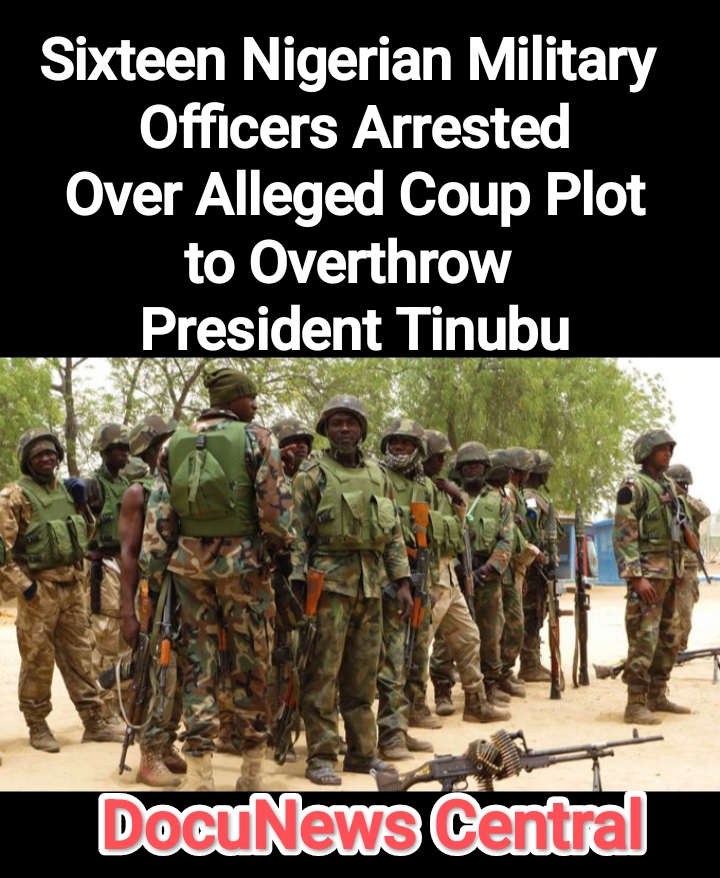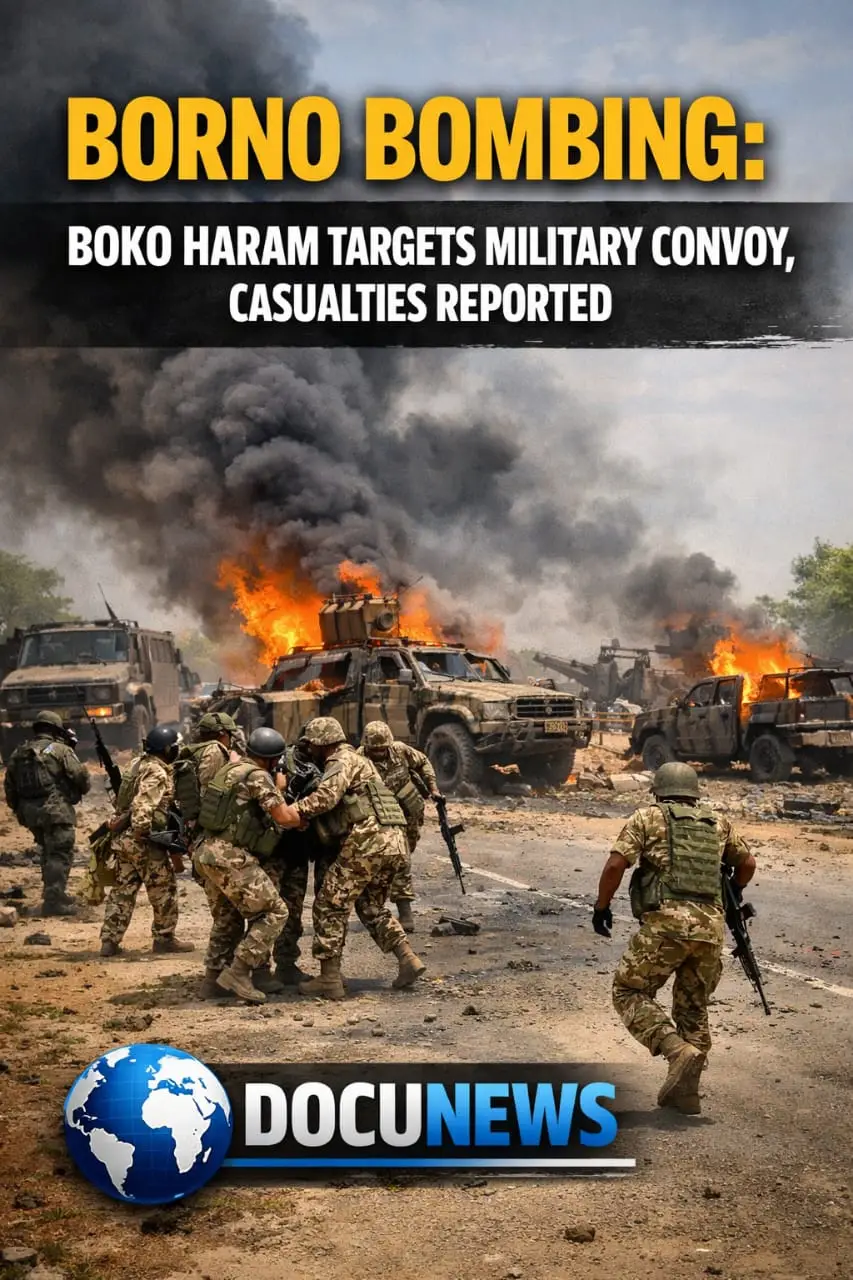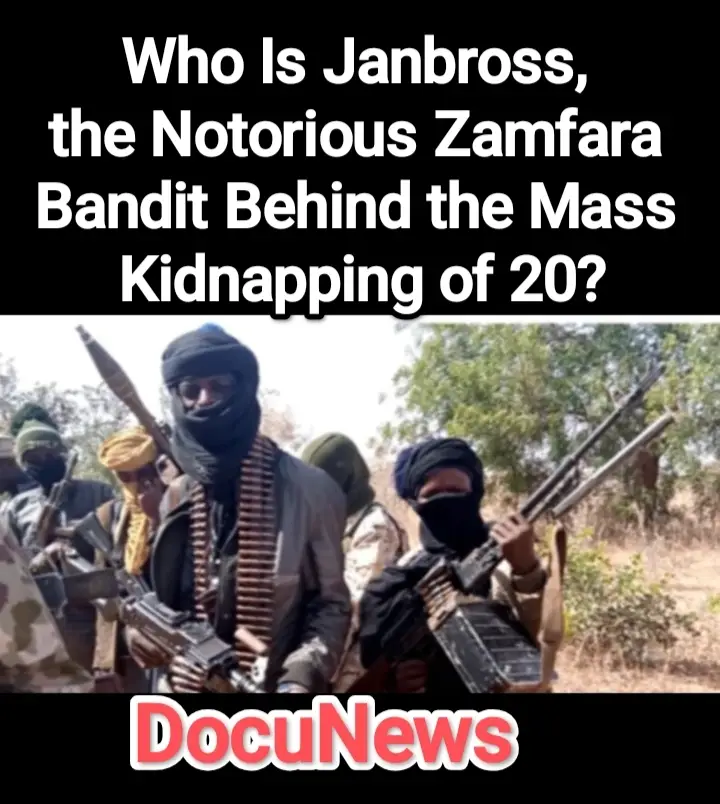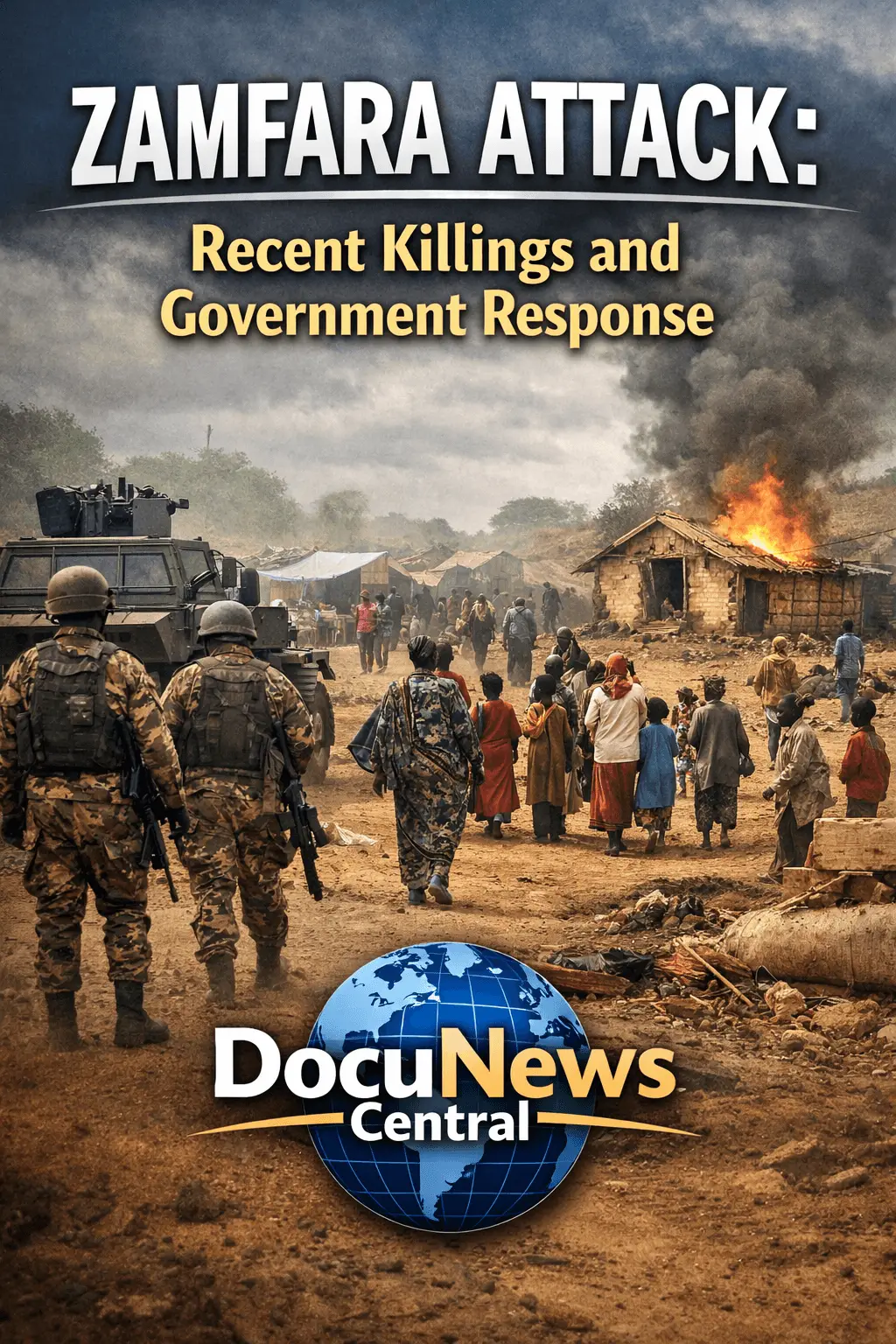
By DocuNews Central
In what appears to be one of the most shocking security developments in Nigeria in recent years, the Armed Forces of Nigeria (AFN) have detained at least sixteen senior officers over an alleged plan to topple the government of President Bola Ahmed Tinubu. The officers, whose ranks reportedly range from Captain to Brigadier-General, were arrested in a coordinated operation led by the Defence Intelligence Agency (DIA) in collaboration with other security services.
The arrests, first reported by SaharaReporters and later echoed by The Punch and The Cable, have triggered widespread conversations about the stability of the Nigerian Armed Forces and the state of national security under the Tinubu administration.

Coordinated Arrests Across Multiple Locations
According to SaharaReporters, the DIA carried out a series of carefully coordinated operations across different parts of the country to pick up the officers. Sources revealed that the suspects were apprehended at their homes and military locations after intelligence reports linked them to an alleged plot to overthrow the President.
While military authorities confirmed that sixteen officers were indeed in custody, the official explanation differed sharply from the leaked intelligence. The Defence Headquarters described the action as a “routine disciplinary exercise,” stating that the affected officers had shown patterns of indiscipline, disobedience, and poor performance in promotion examinations.
However, some insiders claimed that the arrests were connected to more serious activities beyond internal discipline. According to those sources, the DIA allegedly uncovered plans involving secret meetings and a tentative timeline aimed at seizing power by force.
Was There Really a Coup Plan?
The biggest question dominating public discourse is whether this was truly a coup attempt or merely a case of military indiscipline blown out of proportion. A top security source told SaharaReporters that the officers had been holding covert meetings for several weeks, discussing dissatisfaction within the ranks. They allegedly complained about delayed promotions, poor welfare, and the politicization of military leadership under the current administration.
The source claimed that the plotters had considered using the Independence Day parade on October 1 as a symbolic moment to execute the plan. According to that account, the government’s sudden cancellation of the parade may have been tied to intelligence gathered by the DIA.
Nevertheless, no official statement has confirmed that the parade was canceled because of a coup threat. Instead, the Defence Headquarters maintained that the Independence Day celebration was scaled down for “logistical reasons,” not for fear of any internal threat.
Military’s Official Statement
Brigadier General Tukur Gusau, the Director of Defence Information, released a statement following public speculation about the arrests. He confirmed that sixteen officers had been taken into custody but emphasized that their detention was purely administrative. He described the incident as a “disciplinary matter related to conduct and service regulations.”
Gusau explained that the officers’ behavior had violated established codes of military conduct. He said, “The Nigerian Armed Forces remain loyal to the Constitution of the Federal Republic of Nigeria and the Commander-in-Chief. There is no cause for alarm. The ongoing inquiry is part of our internal process to ensure discipline and professionalism.”
His assurance was meant to calm the growing anxiety among citizens and the international community. However, the phrasing of his statement — especially the insistence that “there is no cause for alarm” — did little to silence speculation.
Conflicting Narratives and Rising Public Suspicion
As news spread, Nigerians on social media began to draw comparisons to past military coups that were initially downplayed before becoming public knowledge. Some commentators recalled the early denials that preceded previous coups in the country’s history, arguing that the government’s statement might not reveal the full story. read also Sowore Says Nnamdi Kanu Has Turned Sokoto Into a ‘Mecca’
The Punch and The Cable both reported that the Defence Headquarters’ explanation had not convinced everyone. According to The Cable, several retired officers expressed concern that frustration within the lower and middle ranks of the army has been building for years. They believe that grievances about welfare, promotion, and favoritism in postings could easily escalate into a mutiny if left unaddressed.
At the same time, others insist that the alleged coup story might have been exaggerated by insiders seeking to discredit certain officers. One retired general told The Punch, “It is not unusual for rival factions in the army to frame disciplinary issues as political plots. But this is a serious claim, and it deserves a transparent investigation.”
Nigeria’s Troubled History With Coups
Nigeria’s political journey has been shaped by a long line of military interventions. Since independence in 1960, the country has witnessed multiple coups and attempted takeovers, many of which began with rumors similar to the current one. From Major Chukwuma Nzeogwu’s coup in 1966 to General Sani Abacha’s rise in 1993, each event left deep scars on the nation’s democratic structure.
Given that legacy, any hint of internal rebellion within the Armed Forces is enough to trigger panic. The Nigerian public has become wary of power struggles within the military, knowing that political instability often follows. This explains why the recent arrests have drawn such intense attention and why the story continues to trend across digital platforms.
Analysts React: A Warning Sign or Political Manipulation?
Security analysts remain divided on what the arrests truly signify. Some believe the Tinubu administration is facing growing discontent within the ranks due to economic hardship, insecurity, and perceived favoritism in appointments. Others see the story as a political maneuver — a way to tighten control over the military and neutralize dissenting officers before they pose any real threat.
Dr. Hassan Usman, a political scientist at Ahmadu Bello University, told DocuNews Central that the situation should not be dismissed lightly. He said, “Even if this was not a fully developed coup plot, the fact that sixteen officers are under investigation for conspiracy shows there is tension within the system. It highlights the urgent need for reforms in military welfare, communication, and leadership structure.”
Another analyst, retired Colonel Abiodun Sanni, offered a more cautious view. He argued that labeling the incident a coup could further divide the armed forces and create fear among personnel. He noted, “The military thrives on discipline and unity. Publicly branding senior officers as coup plotters without a full investigation could damage morale.”
Tinubu’s Government Faces Security and Economic Challenges
The alleged coup plot comes at a time when Nigeria is grappling with multiple crises — economic hardship, widespread insecurity, and public dissatisfaction with governance. President Tinubu’s government has been battling to stabilize the naira, reduce inflation, and restore investor confidence after subsidy removal and exchange rate reforms. These challenges have put immense pressure on national institutions, including the military.
Observers believe that internal frustrations within the armed forces may mirror the larger national mood. Low morale, poor housing conditions, and unpaid allowances have been recurring complaints among soldiers deployed in various parts of the country. Some reports also suggest that promotions have become politicized, with favoritism influencing career progression.
If true, these factors could explain why some officers may feel alienated — creating fertile ground for rumors of dissent. Still, the Defence Headquarters insists that the situation is under control and that loyalty to the Commander-in-Chief remains intact.
International Reactions and the Need for Transparency
So far, no major foreign government has issued an official statement regarding the arrests. However, diplomatic observers are closely monitoring developments. Nigeria remains a key regional power in West Africa, and any hint of instability within its military can have far-reaching consequences.
International organizations like the African Union (AU) and the Economic Community of West African States (ECOWAS) are expected to follow the situation carefully. Both bodies have recently condemned a wave of coups across Africa — from Niger to Gabon — and would be deeply concerned about any similar movement in Nigeria.
Transparency, according to analysts, will be crucial to maintaining public trust. The government’s credibility depends on whether it provides clear evidence about the reasons for the arrests and ensures due process for those detained.
What Happens Next
The detained officers are reportedly being held at various secure facilities pending further interrogation by the DIA. It remains unclear whether formal charges will be filed or if they will face a military court-martial. Public expectations are high, and Nigerians are calling for clarity.
If the allegations of coup plotting turn out to be credible, the government will likely pursue prosecutions to send a strong deterrent message. However, if the investigation reveals that the arrests were based on exaggerated intelligence, there could be calls for accountability within the Defence Intelligence structure.
Either way, the incident has exposed the fragile balance between loyalty, frustration, and ambition within the Nigerian Armed Forces.
Conclusion: A Moment for Reflection and Reform
The alleged coup plot against President Tinubu, whether real or exaggerated, serves as a wake-up call. It reflects the deep undercurrents of dissatisfaction that continue to challenge Nigeria’s military establishment. It also underscores the importance of transparency, fairness, and improved welfare across all ranks.
For now, the nation waits for the outcome of the ongoing investigation. The military’s integrity depends on how this matter is resolved. And for the government, this episode is a reminder that stability cannot be sustained by force alone — it must be built on trust, justice, and open communication.
Nigeria has come a long way since the days of military takeovers. Preserving that democratic progress requires vigilance, accountability, and unity among the country’s armed forces.
Copyright © 2025 DocuNews Central. All rights reserved.
Reproduction or redistribution without permission is strictly prohibited.











Can you be more specific about the content of your article? After reading it, I still have some doubts. Hope you can help me. https://accounts.binance.com/es-MX/register-person?ref=GJY4VW8W
Your point of view caught my eye and was very interesting. Thanks. I have a question for you.